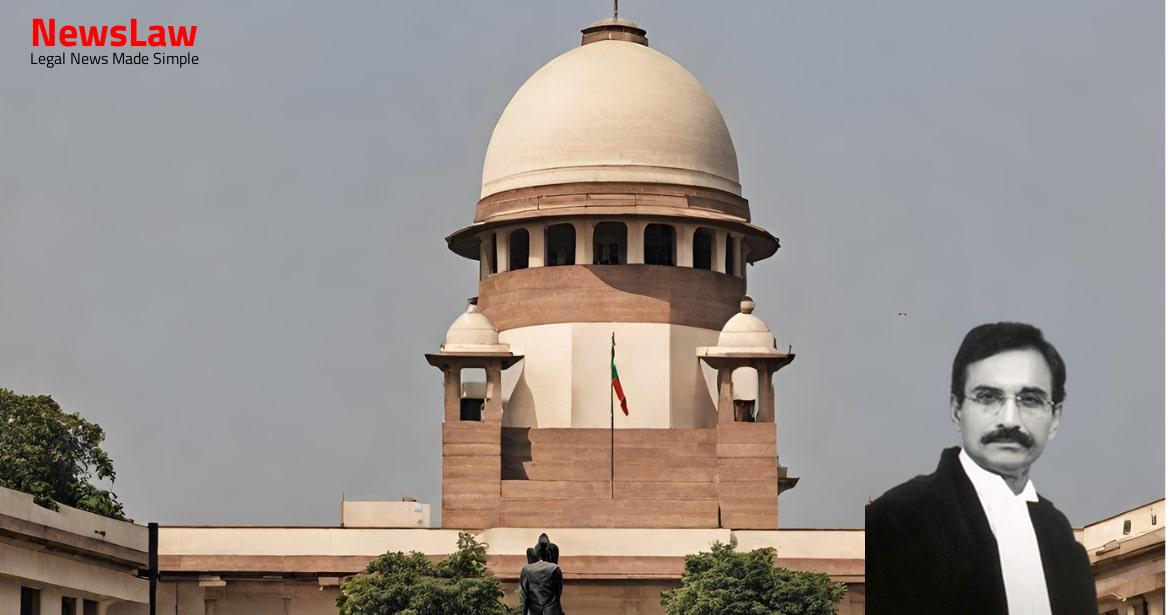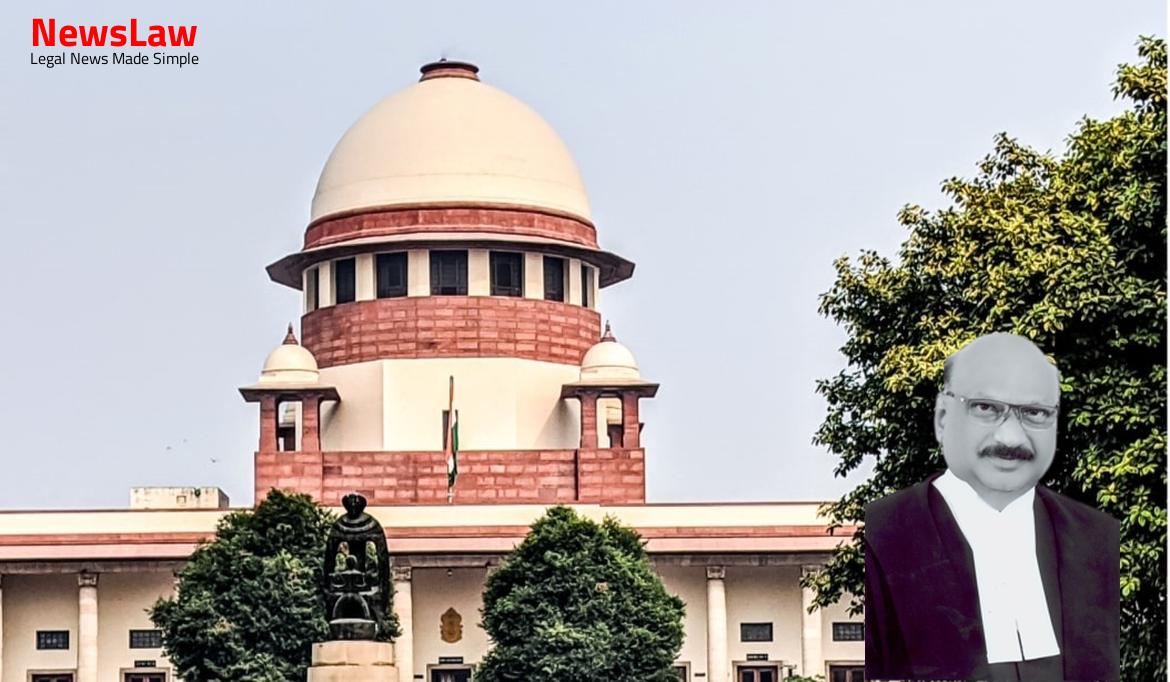Amidst the legal battle over delays in commissioning a solar power project, the Supreme Court of India delivered a crucial judgement. The case, which involved considerations on tariff, force majeure events, and public interest, saw arguments from both parties represented by Mr. Nataraj and Mr. Patil. Learn more about the intricacies of this case and its implications on energy laws.
Facts
- The delay in conversion of land use was attributed to the respondent.
- The respondent’s application for land conversion was on 16.02.2016.
- The respondent delayed the application and cannot attribute it to the authorities.
- Several farmers, including the respondent, raised concerns regarding delay in the execution of the project.
- The Government of Karnataka directed all DISCOMs to examine requests for extension due to delays.
- The respondents requested a 6-month extension under Article 2.5 of the PPA and it was approved.
- KERC rejected various causes of delay by the respondents and strictly interpreted the force majeure clause.
- The PPA was approved by the KERC on 07.09.2015.
- The APTEL observed that the appellant had approved the extension of time by 6 months after a Technical Committee review.
- The respondents were entitled to the benefit of the force majeure clause and an extension of time.
- Delays in obtaining approvals were not the fault of the respondents.
- The date of signing the PPA is not the effective date; it becomes effective upon approval by the KERC.
- The reduction in tariff imposed by the KERC was found to adversely affect farmers who had invested in the projects.
- The imposition of liquidated damages under the PPA was set aside as no delays were attributable to the respondents.
Also Read: Judgment Upheld: Compensation Awarded for Non-performance of Contract
Issue
- Scope of appellate jurisdiction under Section 125 of the Electricity Act, 2003 was examined.
- Issue revolves around the extension of the Scheduled Commissioning Date and its relation to force majeure clause in the Power Purchase Agreement.
- The decision of the Appellate Tribunal for Electricity was upheld.
- Key question is the justification of the reduction in tariff payable to the parties involved.
Also Read: Consumer Rights Upheld: NCDRC Orders Refund and Compensation for Unfair Trade Practices
Arguments
- Mr. Nataraj argued that the delay in approvals for change in land use and evacuation approval was due to the respondents’ failure to comply within the stipulated period under the PPA.
- He stated that despite being aware of the timelines, the respondents delayed their applications and fee payments, attributing the delay to them.
- Mr. Nataraj emphasized that since the government departments provided approvals promptly after the respondents fulfilled requirements, the delay was solely due to the respondents and not a force majeure event.
- Mr. Patil, representing the respondents, mentioned three primary factors causing the delay: land conversion time, approval by KERC, and evacuation approval.
- He argued that there was no force majeure event warranting an extension under the PPA and that the respondents failed to submit a written notice invoking force majeure as required.
- Mr. Patil also contested the late payment surcharge granted by APTEL as it was not pleaded earlier, suggesting that each case should be considered individually by DISCOMs.
- Both counsels focused on whether the delay qualified for force majeure under the PPA, mentioning the impact on tariff and public interest due to delays.
- Appellant submitted that the respondents were able to complete the project within the extended time period.
- Refers to the APTEL’s decision in Chennamangathihalli Solar Power Project LLP v. BESCOM.
- Cited that the APTEL relied on this decision in several subsequent cases.
- Pointed out dismissals of appeals by this Court similar to the present impugned order.
- Argued that the KERC had perversely appreciated evidence of delay and should not have rejected the petition after the appellant had already granted an extension.
Also Read: Interest Calculation in Arbitration Case: Analysis by Supreme Court of India
Analysis
- The delay in commissioning was attributed to delays in securing approvals, not negligence by the respondents.
- The force majeure clause in the PPA (Article 8.3) was deemed applicable to the situation.
- The APTEL correctly extended the time for commissioning as per Article 2.5 due to force majeure events.
- Article 5.1 states that the lower tariff will not apply if there is an extension of time under Article 2.5.
- The delay issue hinges on whether it qualifies as a force majeure event under Article 8.3, impacting the entitlement to an extension under Article 2.5.
- If the delay results from a force majeure event, the tariff cannot be lowered under Article 5.1 and liquidated damages cannot be imposed under Articles 2.2 and 2.5.7.
- The law on force majeure in power purchase agreements (PPAs) was discussed in Energy Watchdog v. Central Electricity Regulatory Commission, where the court emphasized the importance of contractual force majeure clauses over the doctrine of frustration in the Indian Contract Act, 1872.
- The tribunals are best suited to develop a consistent approach to issues of law and fact.
- The requirement for the Supreme Court to consider questions of law must be met, and such questions must be substantial.
- The interpretation of ‘question of law’ must be context-specific.
- The Supreme Court’s jurisdiction under Section 15Z of the SEBI Act is linked to the powers and jurisdiction of the Tribunal under various sections of the Act.
- The Tribunal has the authority to review all questions of fact at the appellate stage under Section 15T of the Act.
- Appellate courts should not hastily classify issues as questions of law that are best left for the Tribunal to decide.
- The Supreme Court will only intervene when there is a genuine question of law from the Tribunal’s decision.
- The UK Supreme Court has outlined principles for appellate courts to intervene based on the existence of questions of law in the Jones v. First Tier Tribunal case.
- APTEL’s decision on attributability of delay is factual and not illegal or unreasonable.
- The direction to pay late payment surcharge is based on the PPA and aligns with the parties’ intention.
- APTEL’s direction to pay late payment surcharge was justified even though not specifically pleaded by the appellant.
- APTEL correctly restored the tariff of Rs. 8.4 per unit and directed payment of the difference amount.
Decision
- The present appeals are dismissed.
- No order as to costs.
Case Title: BANGLORE ELECTRICITY SUPPLY COMPANY LIMITED Vs. HIREHALLI SOLAR POWER PROJECT L.L.P. (2024 INSC 631)
Case Number: C.A. No.-007595 – 2021



